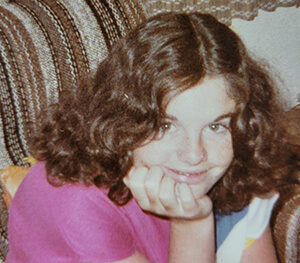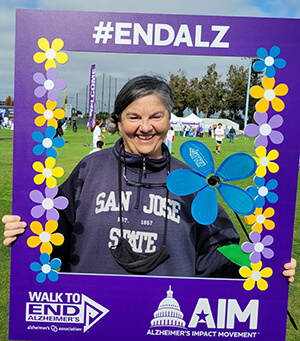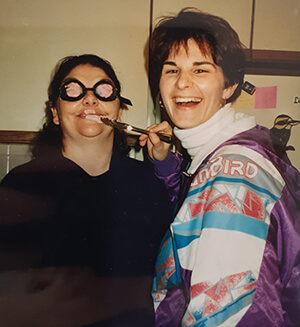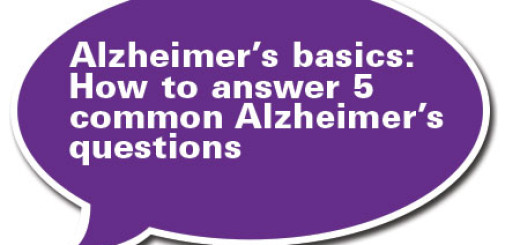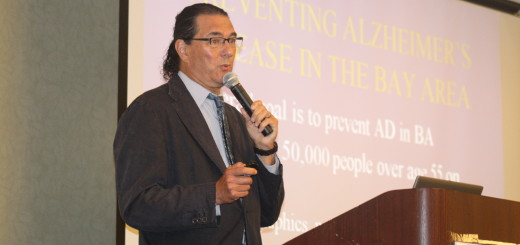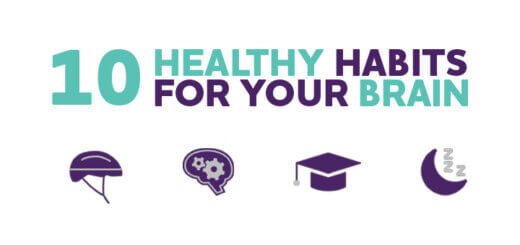San Jose woman’s journey shines light on younger-onset Alzheimer’s
By Kerry Larkey, MSN, RN
Sonja Lilienthal didn’t expect to receive an Alzheimer’s diagnosis, least of all at age 56. By that time, she was already in the practice of meticulously writing out each of her lectures. Every word she wanted to speak needed to be carefully pinned down in advance—sometimes re-written multiple times—to prepare for class. During her 30-year teaching career, Sonja hadn’t always needed lecture notes, but she attributed the habit to a recent attention deficit disorder diagnosis. Looking back, Sonja thinks these were the first signs of what she would eventually be told was younger-onset Alzheimer’s.
An Australian native
Sonja grew up in Sydney, Australia where she went to Sydney Girls High School and would eventually attend the University of Sydney. She took off her third year of university, and used every penny she’d saved to travel the world. “I had saved money from every job that I had until I was 20,” said Sonja. “I worked at McDonalds, delivering car parts and baby-sitting all of the time. I [used that money to] travel by myself to every single country in Europe, including the Soviet Union in 1985.”
Once she returned to school, she met professors that amazed and inspired her. Sonja said, “I wanted to go anywhere the professors recommended. I wanted to go to America.” Making America her next big dream, Sonja attended Penn State University in Pennsylvania where she met her wife, Lisa Lynn Josefik.
One night, during her first week at Penn State, Sonja went to bed early. “I went to sleep, but then realized the gay night was only once a week,” said Sonja. “I got up and went there and met Lisa. She wouldn’t have been there the next week. She was in her last year [at Penn State], and I was still in my first year of masters. We kept in touch while she looked for jobs.”
Sonja and Lisa got married and moved to Ohio where Sonja earned her Ph.D. from Ohio State University. Together Sonja and Lisa moved between the United States and Australia several times before landing in Northern California. There, Sonja became a professor at San Jose State University.
Attention deficit disorder
Being the brilliant person she is, when Sonja began to have a hard time remembering her lesson plans, she wrote every word down. When she noticed she was having a harder time focusing, she put on headphones to concentrate. Being so young, when she mentioned it to her doctors, they assumed it was some kind of attention deficit disorder. No one thought these could be the signs of dementia.
Eventually, it became clear that this was more than an attention deficit disorder. “When you’re diagnosed with attention deficit disorder, you’re usually [a child],” said Sonja. “You’re not in your 40s.” Sonja returned to her doctors at the suggestion of her wife and was finally diagnosed with younger-onset dementia.
What is younger-onset Alzheimer’s?
Receiving an Alzheimer’s diagnosis is difficult and can be particularly unexpected and overwhelming for those with younger-onset dementia (YOD). Younger adults often face special financial challenges, stigma, and misconceptions about their condition.
Alzheimer’s disease is called younger onset (or early-onset) when the person is younger than 65 years old at the time of diagnosis. According to the Alzheimer’s Association® 2023 Alzheimer’s Disease Facts and Figures report, researchers believe about 110 of every 100,000 people ages 30-64 years, or about 200,000 Americans in total, have YOD.
Sonja’s journey highlights some of the most common hurdles experienced by younger adults, particularly those who are still working at the time of diagnosis. By sharing her story, Sonja hopes to educate the public about younger-onset Alzheimer’s while inspiring those living with the disease to advocate for themselves and their individual treatment needs.
Challenges of younger-onset dementia
Misdiagnosis
Research shows that at any age, Alzheimer’s dementia is an under diagnosed problem worldwide[3]. Currently, there are no absolute tests or labs for Alzheimer’s and a diagnosis depends on a physician’s evaluation of the person’s symptoms. On average, those with YOD experience a diagnostic delay of between three and five years[1].
“I had to redo all of my [lecture] notes all of the time and I’d be really specific—like write down everything I needed to say,” said Sonja. “That was three to four years before I was diagnosed. But I don’t think I had ADHD; I think I had early onset Alzheimer’s.”
Sonja’s experience is not uncommon and many people with YOD have had their symptoms misdiagnosed as another neurologic or psychiatric illness[3]. Symptoms like depression, anxiety, or lack of interest are common in YOD[3] and often are misinterpreted as a mental health issue—or even menopause—instead of Alzheimer’s.
Receiving a diagnosis is a crucial step for connecting people to treatment options and support services. Without a diagnosis to explain changes in behavior the person living with YOD may become increasingly isolated from support systems like work colleagues, family and friends.
Work and finances
Like Sonja, many people with YOD are still employed when they receive a diagnosis and may even be the sole provider for their family. It’s not unusual for the early signs of Alzheimer’s to become noticeable in the workplace first as a result of changes in productivity. In fact, sometimes performance issues at work are the motivation for seeking out help and receiving a diagnosis.
At the time of her diagnosis, Sonja was at the peak of her career, working at San Jose State University for over 20 years. An accomplished professor, she has a Ph.D. in Sport Management and Consumer Behavior and has authored several textbooks. Sonja has lectured at universities around the world, including Hong Kong, China and Australia.
“My academic career was awesome,” Sonja says. Writing out lectures was a successful coping strategy and allowed Sonja to continue teaching. Even after her diagnosis, she was eager to continue working and felt confident about her ability to adapt to the changes she experienced. Her passion for education never changed and she enjoyed working with freshman students more than ever.
That all changed abruptly for Sonja at the start of the spring semester in 2023. A last-minute change in courses required her to teach a new class—one that she hadn’t taught or prepared lecture notes for. “This disease forced me to retire without notice,” Sonja explains. The decision was unplanned and incredibly painful for Sonja to make.
Health benefits
Fortunately for Sonja, she was able to retire with full benefits from her tenure as a professor. However, for many, the loss of income and health benefits can have a devastating financial impact on people living with YOD and their families. Particularly when the job loss is unexpected, the family may not have an alternative source of income.
To prevent unanticipated financial hardships, some employers offer disability insurance plans that pay out a percentage of the person’s income. It is important to make sure the plan was established before receiving a diagnosis and each policy has different rules, costs, and benefits to be aware of.
There may be other ways to extend healthcare coverage through resources like Family Medical Leave of Absence, COBRA, or state marketplace health insurance plans. In addition, some retirement plans allow early withdrawals in the case of disability. For more information, review these benefits available through an employer. For those experiencing greater financial hardships, additional assistance may be available through government sources like Social Security disability benefits and Medicare.
Impact on family
The impacts on families of people living with YOD can be different than those who receive an Alzheimer’s diagnosis later in life. Many people with YOD are raising families and have young children at the time of their diagnosis.
Sharing the diagnosis is an important step to accepting Alzheimer’s and finding support. For those with living with the disease, deciding when to disclose this information to children, family, friends, and co-workers often requires careful thought and planning.
Sonja waited 10 months before telling anyone besides her wife and it was a year before she was able to tell her mother face-to-face. It’s entirely normal to take time to decide how to share this delicate news with people. Sonja’s advice to others? “Choose to tell everybody when YOU feel like it,” she says, “It’s your choice. Only tell people who you want to tell.”
Younger-onset and LGBTQ+
Sonja and Lisa have been together for over 35 years. “I know [Lisa] is also struggling with losing me day by day,” Sonja explains, “Together we’re navigating this disease and its devastating impact on our lives.” Although Sonja and Lisa say their experience with YOD has not been impacted by being a part of the LGBTQ+ community, this is not the case for everyone.
Identifying as an LGBTQ+ person can increase isolation while living with Alzheimer’s and present extra challenges for accessing care. For example, according to Alzheimer’s Association’s® Issue Brief: LGBT and Dementia, LGBT couples are less likely to have children to help with their caregiving needs.
Some people report feeling stigmatized by both sexual orientation and their dementia diagnosis. This overlap can result in the experience of a ‘double stigma’, leading to greater loneliness and social isolation[4]. The Issues Brief also shares that fear of mistreatment or discrimination based on sexual orientation can prevent both the person living with dementia and their care partner from reaching out for support.
Fighting for others
As a result of her unique experiences with YOD, Sonja has become a fierce advocate for the rights of those living with Alzheimer’s. In May, she spoke to the crowd at the Alzheimer’s Association’s Access Now rally in front of the Federal Building in San Francisco. As part of a nationwide effort, she helped to lobby Medicare to include coverage for FDA-approved treatments for people living with Alzheimer’s.
But Sonja is also more than her diagnosis; more than an advocate. She is an avid swimmer and former Olympic hopeful. She courageously moved from her home in Sydney, Australia to the United States as a young woman to pursue her dreams. She can rattle off every word of any ABBA song and plans to see them perform live in London. She looks forward to enjoying life with Lisa, their dog and their two cats. “Don’t let your diagnosis consume you,” Sonja says, in closing. “Just figure out what you need to do.”
If you have younger-onset Alzheimer’s, you are not alone. There are many ways to get help, stay active and involved.
- Call our 24/7 Helpline anytime: 800.272.3900.
- Join an Alzheimer’s Association support group. Some groups are just for people with younger- onset Alzheimer’s. To find a support group in your area, call the Helpline at 800.272.3900.
- Be part of ALZConnected, our message boards and online community.
- Whether you’re living with memory loss or caring for someone who is, ALZNavigator™, an online interactive tool, will guide you to your next steps.
- See our I Have Alzheimer’s section for information and tips on living well with Alzheimer’s or other dementia
For more information on LGBTQ+ resources please visit alz.org/lgbtq.
To become an Alzheimer’s Association advocate visit alz.org/advocate.
References
[1] Loi, Samantha M et al. “Young-Onset Dementia Diagnosis, Management and Care: A Narrative Review.” The Medical journal of Australia, vol.218,4 (2023): 182-189. doi:10.5694/mja2.51849
[2] Brosch, Jared, and Farlow, Martin. “Early-Onset Dementia in Adults.” UpToDate, 12 Oct. 2020.
[3] Novek, Sheila, and Verena H. Menec. “Age, Dementia, and Diagnostic Candidacy: Examining the Diagnosis of Young Onset Dementia Using the Candidacy Framework.” Qualitative Health Research, vol. 31, no. 3, Feb. 2021, pp. 498–511. EBSCOhost, https://doi-org.dml.regis.edu/10.1177/1049732320970199.
[4] McParland, James, and Paul M. Camic. “How Do Lesbian and Gay People Experience Dementia?” Dementia (London, England), vol. 17, no. 4, May 2018, pp. 452–77. EBSCOhost, https://doi.org/10.1177/1471301216648471.





